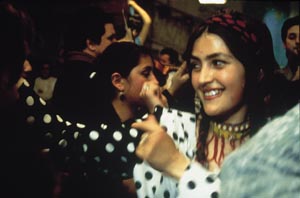 
|
|
|
|

|
 |
 |
San Francisco International Film Festival
Nicholas Cage was wrapping up the Q&A portion of his acceptance of the Peter J. Owens Award at the San Francisco International Film Festival when a woman with long dark hair came running down the aisle to shout a question at the actor. She was an actress from Romania who had read that Cage was of Romanian ancestry. Maybe they were related? And maybe they could work together on a film?
The encounter illustrates the somewhat schizophrenic nature of this festival. The oldest film festival in the Americas, the SFIFF has earned a reputation as a premiere resource for international film. This year 45 countries were represented with 174 films, and the Korean filmmaker Im Kwan Taek received the Akira Kurosawa Lifetime Achievement Award. The flip side, however is the festival’s increasing glitz quotient, exemplified by the Owens Award (last year’s winner was Annette Benning), local press breathlessly reporting Sharon Stone sightings at gala functions, and events like the Lyle Lovett "pub crawl" down Fillmore Street to promote a special screening of The Opposite of Sex.
Still, with practically no industry presence and nary a cell phone to be heard, the serious filmgoers were clearly in the majority. Films like the Russian documentary The Master’s House about Sergei Eisenstein, the six-hour documentary Fragments Jerusalem, and each of Im Kwan Taek’s films were among the most popular screenings. With such an emphasis on international films, should American independent filmmakers premiere their films at the SFIFF? It depends. American indies were fairly well represented this year, although many, like The Opposite of Sex, Gummo, Whatever, Buffalo 66, The Farm: Angola, USA and Paulina were repeats from Sundance or already in theatrical release. Only one of the festival’s six world premiere features was American — Eugene Martin’s Edge City, about class politics amongst a group of Philadelphia teens. And despite the recent explosion of independent film in this country, the SFIFF has no plans to shift its focus to increase the number of films from U.S. filmmakers.
"We are primarily interested in world cinema," said programmer Rachel Rosen, who handles the festival’s American films. To prove her point, she cites that of 200 unsolicited American films, the festival selected only one, Edge City. "With all the recent attention on American indies, and all the hype, it certainly might be easier to get funding and to get press if we [went in that direction]. But as long as distributors like Miramax keep putting out international films we’re going to continue looking for those films to show."
 |
| Rona Hartner in Tony Gatlif's Gadjo Dilo |
Nevertheless Rosen encourages American filmmakers to submit their films, if only for the unique experience San Francisco has to offer. "What you get if you show your film here is the opportunity to show it in a completely different context [than at other festivals]" she said. "Instead of being shown with ten other American independents, it might be shown alongside a Korean film, or a John Barry retrospective. And being at the festival is a completely different experience — it’s all about the interaction with the other filmmakers and the audiences."
Although few films get picked up during the festival, Rosen said that many distributors who have seen a film at another festival will follow it to San Francisco to see how it plays for audiences. "The audiences here are real," said Rosen, "they’re very intelligent about film, the whole diversity of San Francisco is represented, and our audiences are likely to track films they’ve seen here. If something plays well at our festival, it usually does well when it opens here six months later."
Some of those stand-out films included Susan Stern’s documentary, Barbie Nation: An Unauthorized Tour, a bracingly candid look at Barbie and her outspoken creator, Ruth Handler; Jean and the Perfect Guy, a Jacques Demy-styled French musical (starring Demy’s son, Mathieu) about a sexually adventurous girl and the HIV+ boy she falls in love with, which will be released by Strand stateside; Black Tears, a documentary from the Netherlands tracing a group of Cuban musicians; and Blind Faith, a feature about race relations in ‘50s America directed by Spike Lee’s cinematographer, Ernest Dickerson. Although the modern Kabuki theater served as festival headquarters, the festival’s heart belonged to the Castro, a gorgeous single-screen movie palace where crowds lined the block for the sold-out screening of Robert Frank’s rarely-seen Cocksucker Blues, and Jeremy Irons and Wayne Wang took the stage to answer questions after the closing night screening of Chinese Box.
Also a big hit at the Castro: Gadjo Dilo, by Tony Gatlif, (Latcho Drom) a film about a Parisian man’s encounter with a Gypsy community in Romania (to be released this summer by Lion’s Gate). The film’s music so stirred the audience that a fiddler jumped on-stage for an impromptu concert, soon to be joined by the film’s star Rona Hartner, the Romanian actress who had crashed the Nicholas Cage award ceremony. She was last seen dancing on stage as the credits rolled and the audience applauded in time with the music.
-
Cannes Film Festival by Noah Cowan
Gen Art Film Festival by Noah Cowan
docfest by Eugene Hernandez
New York Underground Film Festival by Michelle Handelman
Los Angeles Independent Film Festival by Stephen Garrett
San Francisco International Film Festival by Jennie Yabroff
Santa Barbara International Film Festival by Stephen Garrett
back to top
home page | subscribe | merchandise | history | order form | advertise | contact
archives | links | search
© 2005 Filmmaker Magazine